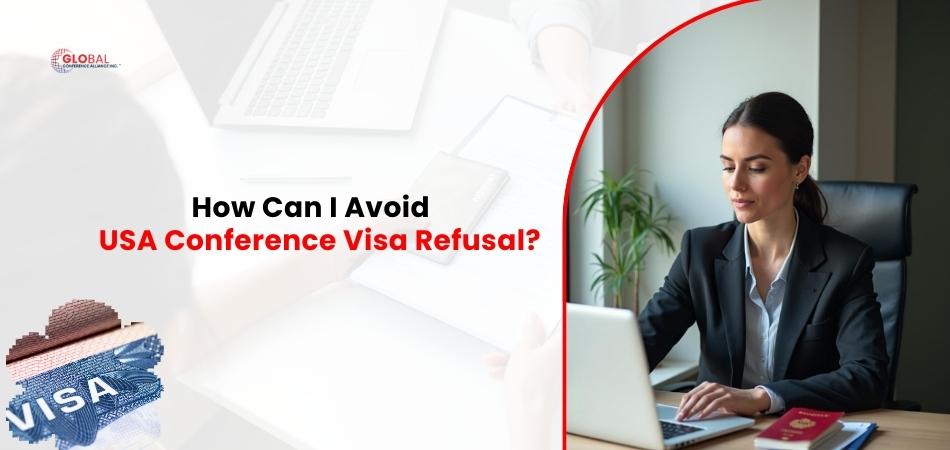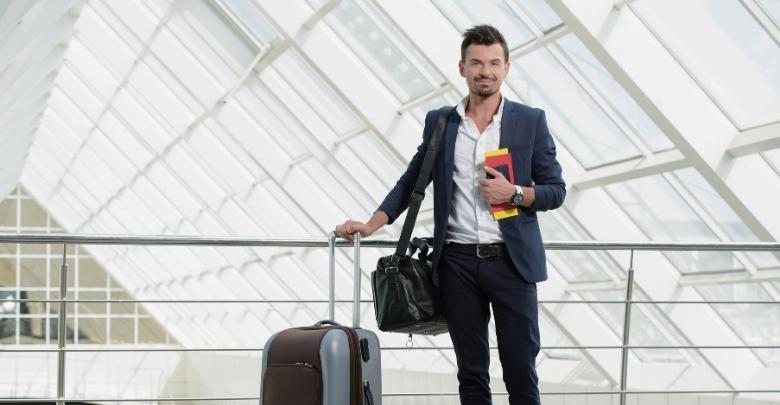Visa refusal can be distressing and stressful, especially when you have important events planned. Some applicants worry about repeated denials or missing crucial opportunities. At this stage, you might be wondering: How can I avoid USA conference visa refusal?
To avoid USA conference visa refusal, ensure complete documents, including a valid passport, detailed invitation letter, and proof of funds. Show strong home ties, such as job or family obligations, to confirm you’ll return promptly. Remain transparent during the interview, and clarify your conference’s purpose and duration.
Are you still curious about the important details involved? By reading on, you’ll find tips, from securing finances to preparing for interviews. Explore each method thoroughly, and you’ll gain the knowledge needed for a smooth USA conference visa approval process.
How Can I Avoid USA Conference Visa Refusal? (10 Proven Ways)
Obtaining a USA conference visa can be a significant step for professionals or students attending important events. However, many applicants face difficulties. Successful approval requires awareness of the process and ways to improve your chances. Here’s how.

Submit Complete and Accurate Documentation
Ensure that all required documents are complete and accurate. Incomplete or incorrect forms can lead to rejection. Pay attention to details like passport validity, invitation letters, and financial documents. Providing the right supporting documents, including the purpose of your trip, can help demonstrate your seriousness.
Provide a Valid Conference Invitation
If you’re applying for a visa to attend an international conference in USA, make sure the invitation letter is from an internationally recognized organization. This invitation should clearly state your role in the conference, the duration, and its relevance to your professional development. It helps in proving the purpose of your visit.
Demonstrate Strong Ties to Your Home Country
A major concern for visa officers is ensuring applicants will return to their home country after the event. Provide evidence of strong ties such as a stable job, ongoing studies, or family commitments. These ties assure the officer that you do not intend to overstay your visa.
Ensure Your Financial Stability
Visa officers want to confirm that you can financially support yourself during the conference without relying on U.S. resources. Provide bank statements, sponsorship letters, or proof of employment that show sufficient funds. This can strengthen your case and reduce the chances of refusal.
Prepare for the Interview
Make sure you are well-prepared for your visa interview. Be ready to explain why you want to attend the conference and how it relates to your career or academic goals. Answer confidently and clearly, showing that you are well-prepared and serious about your trip. Practicing potential questions can help you feel more comfortable.
Keep Your Travel Plans Organized
Have a clear travel itinerary, including your flight and accommodation details. Demonstrating a well-organized trip plan assures visa officers that you are not intending to deviate from the purpose of your visit. This organized approach can make your application more credible.
Avoid Overstaying on Previous U.S. Visits
If you’ve visited the U.S. before, ensure you have adhered to the terms of your previous visa. Any record of overstaying can seriously damage your chances of approval. Be sure to keep track of your previous trips to ensure you comply with U.S. visa regulations.
Be Honest in Your Application
Honesty is crucial when filling out your visa application. If there are any previous visa refusals or issues with past U.S. visits, disclose them truthfully. Lying or withholding information can lead to automatic denial and damage your chances of future approval.
Highlight the Importance of the Conference
Make sure to highlight why attending the conference is important for your professional or academic growth. Explain how participating in the event will contribute to your future endeavors, which will reinforce the necessity of your trip to the U.S. visa officers.
Stay Updated on U.S. Visa Policies
Visa policies can change, so make sure you stay updated on the latest information. Check the official U.S. embassy or consulate website for any updates regarding conference visas and the required documentation. Being well-informed ensures you don’t miss out on any recent changes that may affect your application.
Applying for a USA conference visa requires careful preparation, honesty, and attention to detail. By following these tips, you can significantly reduce the risk of visa refusal and increase your chances of approval.
How Can I Ensure That All the Details in My Documentation Are Consistent and Accurate?
Documentation accuracy and consistency are crucial for ensuring the reliability of any written material. Whether it’s for academic, technical, or personal use, maintaining high standards of detail can make your work easier to understand and more trustworthy. Here are steps to help ensure your documentation is both accurate and consistent:
Step 1. Double-check facts and data
Before including any data, statistics, or facts, verify their accuracy through reliable sources. Misinformation can easily creep in, so cross-reference details from reputable references to confirm their correctness. Keeping track of your sources will help you maintain consistency throughout your document.
Step 2. Maintain a clear structure
An organized structure not only improves readability but also ensures that all sections are consistent. Break your content into clear sections with appropriate headings and subheadings. This will make it easier to follow and less likely that details will be missed or contradicted.
Step 3. Use a style guide
Having a style guide is essential for maintaining consistency in your documentation. It defines rules for formatting, language usage, and tone. This helps you avoid inconsistencies in terms of font sizes, citation styles, and other visual elements, making your document cohesive.
Step 4. Proofread and revise
Relying solely on the first draft can lead to overlooked mistakes. After completing your documentation, take time to proofread and revise. Look for inconsistencies in the information, structure, or language. A fresh perspective will often help you identify any errors you may have missed earlier.
Step 5. Seek feedback from others
Sometimes, it’s difficult to spot errors in our work. Ask peers or colleagues to review your documentation. They can provide valuable insights, catching inconsistencies or inaccuracies that you might have overlooked. Their feedback will contribute to improving the overall quality of the document.
Ensuring consistency and accuracy in your documentation is a continuous process that requires attention to detail. Regular reviews, following guidelines, and using reliable sources are key to making your content trustworthy and clear for readers.
Travel Rules for Professionals Attending Events in the USA
Professionals traveling for conferences in the United States often have questions about guidelines and official procedures. These rules can involve documents, fees, and staying aligned with regulations. Below, we will explore the main considerations more thoroughly in detail.
Be Aware of Your Visa Options
Many individuals traveling for professional events need to clarify which visa category fits their purpose. Common types include business visitor visas and temporary worker visas, depending on the nature of participation. Consulting the official government pages is wise, since application processes, interview requirements, and validity periods can change due to policy updates.
Documentation for Conference Attendance
Some events ask attendees to provide formal letters or registration proofs. These documents confirm your participation and can help immigration officers understand your purpose. Make sure names, dates, and locations match your itinerary details. If sponsors or hosts are involved, their letters can strengthen your case and reduce issues at entry.
Timeframes and Itineraries
Professionals often stay a bit longer after an event ends, especially to meet collaborators or tour nearby places. In some situations, traveling to USA with post-conference visa makes sense if extra days are permitted. However, you should follow the validity dates of your visa and respect any program guidelines to avoid complications.
Accommodation and Travel Expenses
Event organizers sometimes offer discount rates or negotiated deals for certain hotels. Keep receipts for housing, flights, and any fees, since you might need to show they align with your purpose. Maintaining clear records helps in case of inquiries by embassy officials. Always verify the latest rules to avoid misunderstandings or delayed approvals.
Adhering to Border Control Requirements
When you arrive, border officials might ask you about your planned stay. Prepare to answer inquiries about the conference, funding, and length of visit. Honesty and clarity are vital, since any mismatch can lead to refusal of entry. Keep official notices, conference confirmations, and other relevant papers organized for quick reference when asked.
Staying informed and prepared is crucial for a smooth event visit in the United States. Observe official updates, keep thorough records, and communicate clearly to avoid problems. By taking practical steps, you can fully fulfill all necessary guidelines.
How Can I Effectively Communicate the Purpose of My Visit During the Visa Interview?
When attending an interview, effectively communicating your purpose is essential for leaving a positive impression. It helps interviewers understand why you’re interested in the position or opportunity and how you align with their goals. Here are some tips for articulating your purpose clearly.
Be clear about your objective
Before the interview, spend some time reflecting on your purpose and what you hope to achieve. Whether you are applying for a job or simply learning more about the company, being clear on your objective will help you articulate your intentions. A focused goal makes you sound more confident and purposeful in your communication.
Link your skills to the position
One of the best ways to communicate your purpose is by aligning your skills with the job at hand. Show how your experience matches the job requirements, and explain how your qualifications will benefit the company. By doing this, you demonstrate that you’re not just visiting out of curiosity but to make a meaningful contribution.
Show enthusiasm and interest
A key part of communicating your purpose effectively is showing enthusiasm for the opportunity. Your passion will make your objective seem more genuine and persuasive. Make sure to express interest in the company’s work culture, the role, and its responsibilities. Enthusiasm shows that you’re fully committed to being part of the organization.
Be concise and direct
While it’s important to express your purpose, it’s equally crucial to be concise. Avoid over-explaining or veering off-topic. Staying on point allows the interviewer to easily grasp your objective, making you appear organized and focused. A clear, direct answer ensures that the interviewer understands your reason for being there without confusion.
Ask insightful questions
Asking thoughtful and relevant questions demonstrates that you’re genuinely engaged and have done your homework. These questions can reflect your acceptance of the role and the company’s goals. Inquiring about challenges or growth opportunities shows that you’re considering the long-term potential of the position, reinforcing the purpose of your visit.
Connect your values to the company
You can strengthen your message by aligning your personal values with the company’s mission. Share how their values resonate with you and how you see yourself contributing to their goals. This connection highlights the purpose of your visit, suggesting you’re not just a good fit for the role but also for the company culture.
Effectively communicating your purpose during an interview involves being clear, direct, and enthusiastic. By connecting your skills and values to the company’s needs, you show that you’re serious and well-prepared for the opportunity.
What Steps Can I Take to Strengthen My Visa Application After a Refusal?
A visa refusal can be discouraging, but you should view it as an opportunity to strengthen your application. Knowing why your visa was denied and taking the right steps can improve your chances of future success. Below are some helpful strategies to strengthen your visa application after a refusal.
Review the refusal reason carefully
The first step is to understand why your visa was denied. Look for specific reasons mentioned in the refusal notice. This will guide your next steps. If you feel the refusal was due to insufficient documents or an unclear explanation, consider handling USA visa refusal documents to address the gaps.
Gather more supporting evidence
Providing additional supporting documents can strengthen your application. Ensure that you have clear, accurate, and updated financial documents, ties to your home country, and any other paperwork that proves your eligibility. This additional information can help clarify your intentions and solidify your case.
Reassess your application form
Double-check your application form for any errors or incomplete sections. A small mistake or missing detail could lead to a visa refusal. Ensure that all information is accurate and complete before resubmitting. You may even want to seek advice from a professional to ensure the form is correct.
Provide a stronger personal statement
A well-written personal statement can make a significant difference. Use this opportunity to clearly explain your reasons for traveling, how you meet the visa requirements, and how you plan to return to your home country. A strong, persuasive statement can improve the chances of approval.
Consult a visa expert or lawyer
If you’re uncertain about how to proceed after a refusal, consider seeking professional advice. A visa consultant or lawyer can help review your case, provide insights into what went wrong, and guide you on the best approach for your next application. Their expertise can boost your chances of success.
Handling a visa refusal involves figuring out the reasons behind it and taking corrective measures. By providing more evidence, correcting mistakes, and seeking professional help, you can improve your chances of getting approved in future applications.
FAQs About How Can I Avoid USA Conference Visa Refusal?
Below are some additional questions related to avoiding a USA conference visa refusal, offering further guidance for applicants. These answers will help clarify any concerns that might still linger after going through the application process.
How Can I Improve My Chances If I Have A Prior Visa Refusal?
If you’ve faced a previous visa refusal, you should address the reason for denial in your new application. Be transparent about the previous refusal, provide additional supporting documents, and show that your situation has changed, increasing the chances of approval for your conference visa.
How Can I Make My Financial Documents Stand Out?
To strengthen your financial documents, ensure they are current, clear, and detailed. Provide bank statements for at least the past three months, along with any proof of employment or sponsorship. This shows you have adequate resources to cover your stay and won’t rely on U.S. financial support.
Can I Attend Multiple Conferences With A Single USA Conference Visa?
In most cases, a USA conference visa is specific to the conference listed on your application. If you plan to attend multiple events, you may need to apply for separate visas or demonstrate that the conferences are connected in terms of dates and locations. Always check the specific visa guidelines for your case.
Should I Mention Family Commitments in My Visa Application?
Yes, mentioning family commitments can strengthen your application by demonstrating strong ties to your home country. Proof of a stable family situation, such as dependents or elderly relatives, reassures the visa officer that you intend to return after the conference and won’t overstay your visa.
How Long Does It Take To Get Approval For A USA Conference Visa?
The processing time for a USA conference visa can vary depending on the embassy or consulate. On average, it may take 3-5 weeks, but it’s best to apply well in advance to account for delays. Make sure to plan, especially during peak travel seasons.
Can I Appeal A USA Conference Visa Refusal?
If your USA conference visa is denied, you can appeal the decision by addressing the reasons for refusal in your next application. You may also request a re-evaluation if new information or documentation can support your case. Consulting an immigration lawyer can be helpful in such situations.
End Note
Securing a USA conference visa requires careful preparation and attention to detail. Understanding the common reasons for refusal and addressing them proactively can significantly enhance your chances of approval. By following the strategies outlined, you can present a strong and convincing application.
When asking yourself, how can I avoid USA conference visa refusal, the key is to ensure that every aspect of your application is thorough and accurate. Submit complete documentation, demonstrate strong ties to your home country, and clearly articulate the purpose of your visit. These steps collectively help in presenting a credible and reliable application to visa officers.
As you prepare your visa application, remember to stay organized and truthful throughout the process. Double-check all documents, practice for your interview, and seek guidance if needed. Best of luck with your application, and may your conference experience in the USA be successful and rewarding!







